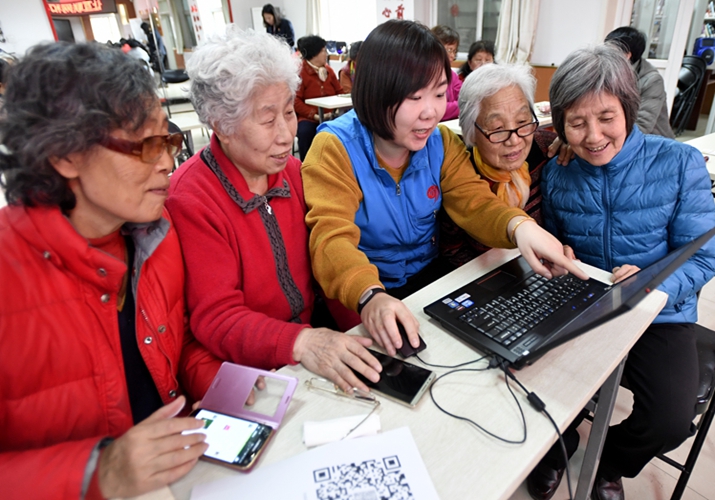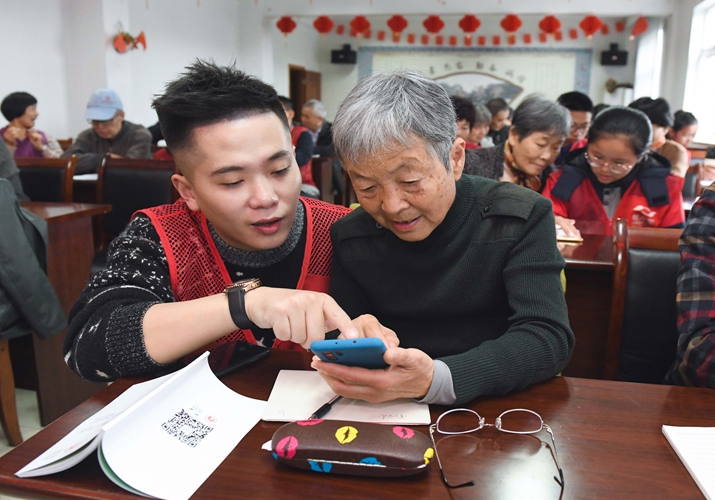| China |
| Volunteers pitch in to help senior citizens cross the hurdle | |
|
|
 A volunteer (center) teaches seniors in Meiyuan Community in Beijing how to stay safe from telecom fraud on March 16, 2018 (XINHUA)
Nowadays, smartphone app Health Kit has become a must-have "passport" for people to go anywhere in China due to the novel coronavirus disease (COVID-19). However, though the app is handy for identifying those at risk of being infected through a color-coded system, it has left some people, mostly senior citizens who are relatively new to smartphones, in an awkward situation.
Yu Bin, who works at the Temple of Heaven, a famous park in Beijing, checks the health code of every visitor at the entrance. Green means a person is healthy, whereas yellow and red respectively mean a person should self-isolate and go to a doctor.
"We can't allow them in if they cannot show us their green code," Yu told Beijing Daily. The Temple of Heaven is a place where many seniors living nearby do morning exercises. Yu said every morning he has to help more than 100 seniors access the Health Kit on their smartphones, if they have one, before entering the park.
The health code is required to access many venues. There have been complaints from seniors who couldn't get onto buses or take subways or get into local convenience stores for a quick shopping trip because they can't access the Health Kit using a smartphone. "You can't expect a person of my age to remember the steps to access the Health Kit," an 87-year-old in Beijing surnamed Wang told Beijing Radio.
On October 14, the scene of an elder shouting inside a hospital in Sichuan Province, southwest China, went viral. To reduce person-to-person contact and increase efficiency, the hospital had decided to close its registration windows and use registration machines and its smartphone app. The man felt frustrated as he couldn't manage to do either.
Digital refugees
On October 25, China celebrated the traditional Double Ninth Festival, also known as Seniors' Day. It is a day for worshipping ancestors and praying for the longevity of senior citizens.
Two days before the festival, Li Banghua, deputy head of the elderly care department under the Ministry of Civil Affairs, said at a quarterly news conference that the ministry is now drafting the elderly care chapter of the 14th Five-Year Plan (2020-25) as the number of citizens aged 60 and above is expected to surpass 300 million in the next five years.
The China National Committee on Aging estimates that the number of aged people will climb to 423 million by 2036 and up to 487 million by 2053. By then, China will face the most severe population aging in the world.
"Digital divide is a common issue of all aging societies across the world," Yang Yifan, a professor from Southwest Jiaotong University in Chengdu, Sichuan, said. "Compared with the knowledge and education gaps, this specific gap appears to be the tougher one to fill in."
It is relatively hard for seniors to learn new technology. For some, a cellphone serves no other purpose than making and receiving calls. Before the spread of COVID-19, it was perfectly fine for seniors to stick to their traditional lifestyle. For instance, if they didn't want to use e-payment methods, they could pay by cash. But the epidemic has compelled them to use smartphones, Yang said.
"Actually, it is more than merely the Health Kit," Zhou Yuqiong, a professor from Shenzhen University, Guangdong Province in south China, told Xinhua News Agency, "As almost everything in our daily life has turned smart, activities including booking train tickets and ordering takeout can be done simply through clicks for the younger generation. But for many seniors, it makes life even harder."
The digital gap has also caused a bout of negative reactions to senior citizens, stigmatizing them as outdated and too stubborn to learn modern matters, she said.
"It is not about whether or not they are willing to welcome new technology into their lives, it is whether or not they are capable of doing so. Some are either illiterate or their eyesight is too poor to read the words on smartphones," Zhou said. "Most tech companies haven't given enough consideration to senior people's needs, worsening the situation."
"Every time we go home for the holidays, my brother and I talk about online gaming, my parents and their peers talk about popular online videos," said Lu Yibin, a college student from Sichuan. "My grandparents, who are illiterate and don't have smartphones, just sit there in silence."
Lu felt sad about this as he could tell his grandparents wanted to join them in the talks but didn't know how. "My parents, my brother and I don't live with my grandparents," Lu said. "If my grandparents only knew how to make video calls using a smartphone, they could see us whenever they miss us. We tried to teach them how to do that for quite a few times, but they complained the steps were too complicated and gave up finally."
 A volunteer from Qian Haijun Volunteer Service shows a senior how to use a smartphone in Cixi, Zhejiang Province in east China, on November 24, 2019 (XINHUA)
The helpers
Zhou doesn't support the idea of a "full-digital" society and suggests alternative choices for the seniors, so that those blocked by the "digital fence" too can enjoy public services.
She said students should play an important role in helping older family members get into the digital world.
"Seniors, with fading memory, often can't remember the steps," she said. "Even though some volunteers go to the communities to teach them, it is not easy. The younger members in families should do the teaching."
Li Chengbo, an associate professor from Chongqing University in southwest China, has different ideas. "As the family structure in China has changed a lot in the past decades, it is now common for seniors to live separately from their children," he said. Since China adopted the family planning policy in 1980, many couples in their 60s have only one child. "The time the only-child generation spends with seniors is quite limited."
Li regards volunteers as the major force in helping senior citizens in the future. "The volunteers normally gather seniors in the same community together to teach them," Li said. "Seniors are more willing to learn together with their peers. We should make efforts to build a larger and stronger volunteer force.
Qian Haijun Volunteer Service, a volunteer group set up in 2012 in Ningbo, Zhejiang Province in east China, offers help to those in need, especially the elderly. The volunteers regularly visit communities across Ningjun, looking after their health and teaching them how to use mobile apps.
"Now we have over 1,000 volunteers and the number has been steadily increasing," Qian Haijun, founder of the group, told Ningbo Television. "The seniors need company and patience. I hope more young people will join in the volunteer work in the following years."
(Print Edition Title: The Digital Fence )
Copyedited by Elsbeth van Paridon
Comments to yuanyuan@bjreview.com
|
|
||||||||||||||||||||||||||||||
|